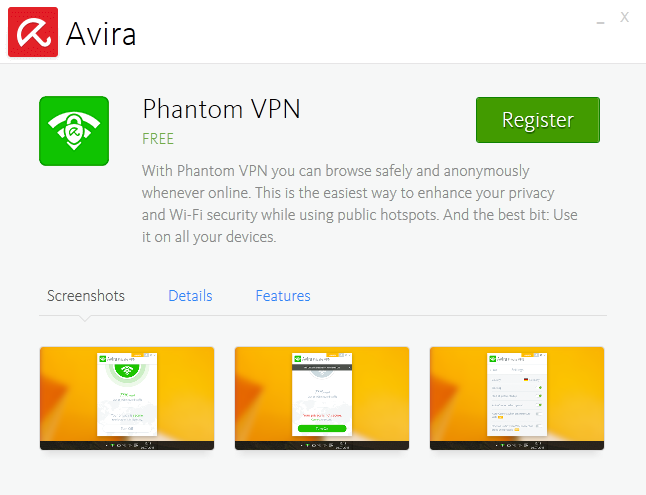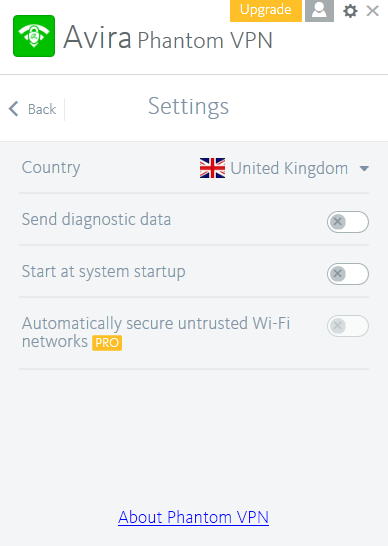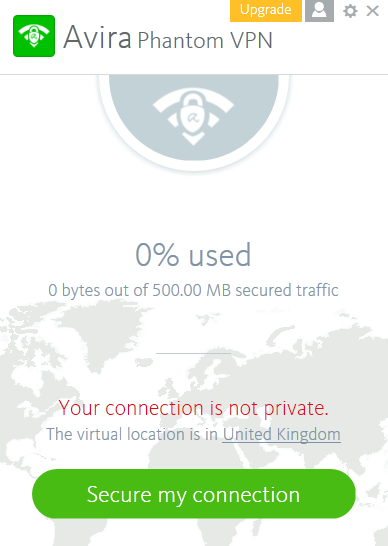Avira Phantom VPN first look
Avira just launched Avira Phantom VPN, a free and paid virtual private network (VPN) service for Android and Windows devices.
The free version of the service is good for 500 Megabytes of traffic each month but you can double that amount by registering an account. The pro version is available for €59.95 and is good for unlimited traffic.
Both share most features including a no logging policy for visited websites and access to all country servers the virtual private network service makes available.
Avira Phantom VPN

Installation is somewhat problematic on Windows, here is why. When you download the program for Windows and run it afterwards on your system, Avira Launcher is installed first.
This is the central application for all things Avira on Windows. Using it you can install Avira Phantom VPN or any other Avira application.
The installation itself is quick but requires an active Internet connection. Avira displays a register dialog afterwards which looks on first glance like one of those forced dialogs that you cannot close.
Turns out, you can close it by selecting the x icon in the upper right corner of the screen to forego the registration and use the VPN without account.
Settings

First thing you may want to do after installation is open the program settings. There you find the country selector that you use to switch between different countries the VPN supports.
Avira Phantom VPN supports mostly European countries, Germany, Switzerland, Spain, France, Poland and the UK. The only two non-European countries are Canada and the United States.
The program is set up to send diagnostic data by default which you can disable in the settings as well. The only other option available for free users is to start it at system start.
The settings highlight one feature exclusive to the pro version, and that is to use the VPN automatically when the device is connected to an untrusted Wi-Fi network.
Using Avira Phantom VPN

A click on the secure my connection button connects the device to the selected virtual location. Avira Phantom VPN highlights the connection status in its interface afterwards and displays the traffic quota there as well.
Download and upload speed were fast on a test system. While the VPN did not max out the 50/10 Mbit connection, it managed to deliver 43/8 Mbit instead.
I noticed during tests however that connections to sites took a bit longer to initiate. There is a bit of a delay before sites are loaded regardless of server you select or browser you are using.
This does not happen when the test device is connected to other VPN services.
Avira Phantom VPN does not leak the public IP address when WebRTC is being used.
The free version is limited to 500 Megabyte per month which should be enough for regular web browsing but will burn through the traffic in less than an hour if you consume media for instance.
While you can bump up the free traffic to 1 Gigabyte per month by registering, this too won't be enough for demanding services.
You are probably wondering what happens when you reach the traffic limit. The connection to the VPN is not cut off immediately but the interface displays a disconnection countdown but traffic continues to flow during the countdown.
The VPN is disconnected automatically without prompt or further warning which is problematic from a security/privacy view point.
The pro price is quite high especially when you compare it to established VPN services such as Private Internet Access or others. Private Internet Access is available for $39.95 per year for instance, and it offers better device support, more countries, different protocols and features such as a kill switch.
Closing Words
Avira Phantom VPN is a new VPN service that is speedy and easy to use (apart from installation). The free version is good for light web browsing due to the imposed traffic limit.
The pro version does away with the limit but is quite costly when you compare price and features to established VPN services.
This article was first seen on ComTek's "TekBits" Technology News

- Log in to post comments